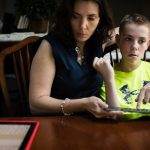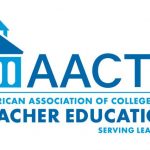“On the anniversary of Juneteenth, hundreds of mostly young, Black protesters went directly to the Hartford mayor’s brownstone house in downtown with a simple demand: abolish police,” co-writes Robert Cotto, a Neag School doctoral student. “Despite their demand, the mayor’s response was a mismatch. Instead of defunding, abolishing, or even tangibly reducing the size of the police, the mayor recommended building more affordable housing in the suburbs. Rather than racial and economic justice for the Black and Puerto Rican people in Hartford now, the response was clear: I will not help you change policies, but I will help you leave.”
Children don’t come with how-to manuals. Even if they did, they would all require a manual of their own, tailored to their unique make and model. That’s why caregiving can be rewarding, as well as puzzling and demanding – particularly for family caregivers of children with disabilities. Although these caregivers often report that the role gives them a sense of purpose, it usually comes with physical, emotional and financial strains. COVID-19 has added major hurdles to accessing, delivering and evaluating special education services.
Children don’t come with how-to manuals. Even if they did, they would all require a manual of their own, tailored to their unique make and model. That’s why caregiving can be rewarding, as well as puzzling and demanding – particularly for family caregivers of children with disabilities. Although these caregivers often report that the role gives them a sense of purpose, it usually comes with physical, emotional and financial strains. COVID-19 has added major hurdles to accessing, delivering and evaluating special education services.
Beginning in Fall 2021, UConn’s Neag School of Education will be offering a new program in American Sign Language (ASL) education. Recently approved by the Connecticut Board of Education, the program is designed to prepare aspiring educators interested in becoming teachers of ASL. UConn became the first higher education institution in the state to offer a four-year bachelor’s degree in ASL when the College of Liberal Arts and Sciences introduced an ASL major earlier this year. This new world language ASL education program will likewise be the first of its kind in the state of Connecticut.
This fall, the American Association of Colleges for Teacher Education (AACTE) selected UConn’s Neag School of Education to join its Holmes Scholars Program, a nationwide network of higher education institutions seeking to support students from historically underrepresented communities enrolled in graduate programs across the field of education.
Sandra Chafouleas, a professor in the Neag School of Education at UConn, said that families should come up with a plan and schedule, including time away from all devices.
Today, we join the world in marking International Human Rights Day. Throughout this year, communities near and far have faced some of the most significant human rights challenges since the United Nations adopted the Universal Declaration of Human Rights in 1948.
Today, we join the world in marking International Human Rights Day. Throughout this year, communities near and far have faced some of the most significant human rights challenges since the United Nations adopted the Universal Declaration of Human Rights in 1948.
“Distance learning with elementary students is an entirely different experience from working with them in-person,” says Kimy Velasquez, a Neag School education student. “Everything I imagined my internship to me is different from what I expected. Despite this, there are still opportunities to learn and grow as an upcoming teacher in this new environment.”
Since the beginning of COVID-19, millions of students nationwide have been forced into online learning. Many of those experiences have been negative because of schools’ lack of preparation, because of some faculty not considering student needs, and because of financial stresses. Online learning is especially affecting students majoring in sciences, education, and the fine arts; international students and students living in different time zones; students from low-income families and students with disabilities.




